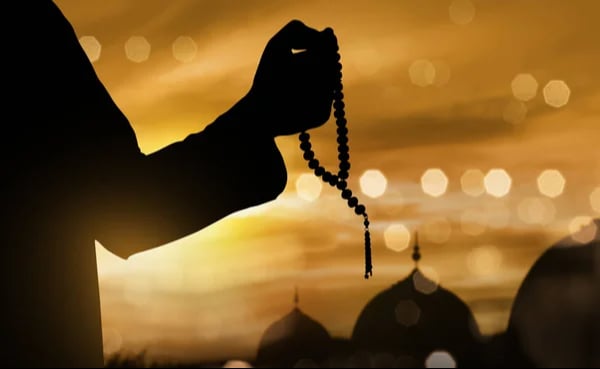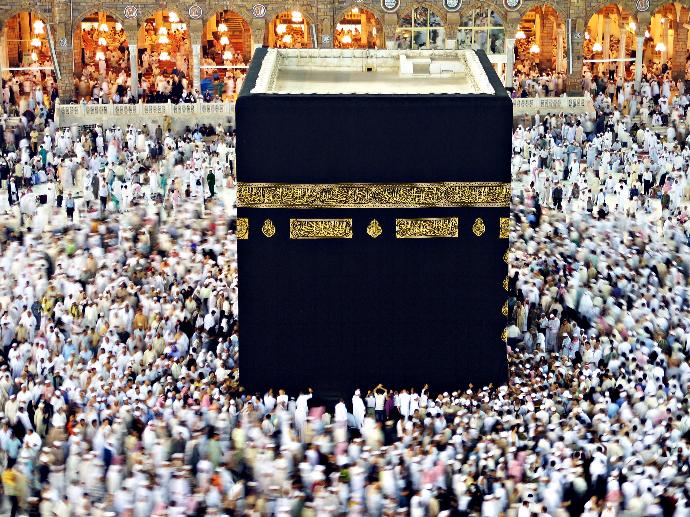The five pillars of Islam are five key practices that all Muslims are obligated to fulfill throughout their lifetime. These practices are referred to as pillars because they form the foundation of Muslim life.
Below, we outline the five pillars along with their significance, followed by some facts to deepen your understanding of the profound meaning behind these pillars.
What are the five pillars of Islam
The five pillars of Islam are Shahada, Salah, Zakat, Sawm, and Hajj. The Messenger of Allah, Prophet Muhammad (peace be upon him), describes Islam as having been “built on five,” referring to the five pillars (Al Bukhari and Muslim).
Together, they construct a framework that influences every moment of one’s life – a life devoted to Allah SWT.

Shahada
The Shahada is the first of the five pillars of Islam. ‘Shahada’ is the Arabic term for the declaration of faith in one God (Allah) and His Messenger (PBUH). This sacred statement is the central tenet of the Islamic faith and encapsulates the essence of being a Muslim.
“أشهد آن لاإله إلا الله، وأشهد أن محمداً رسول الله”“Ash-hadu an la ilaha illa Allah, Wa ash-hadu anna Muhammadan Rasulu-Allah.”“I bear witness that there is no God but God (Allah – i.e. there is none worthy of worship but Allah), and Muhammad is the Messenger of Allah.”
Salah
Salah (salat) is the obligatory ritual prayer in Islam, performed five times daily. Integral to the lifestyle of a Muslim, it entails reflecting on the verses of the Qur’an, the Shahadah, and Allah’s attributes. Muslims pray in the direction of the Kaaba in Mecca, as a means of connecting to Allah and their purpose – to remember and worship Him.
5 daily prayers include:
-
Fajr - This takes place at pre-dawn
-
Dhuhr - This takes place just after the sun reaches its zenith
-
Asr - This takes place between noon and sunset
-
Maghrib - This takes place just after sunset
-
Isha - This takes place during the night/at night-time
Zakat
Zakat, or almsgiving is the act of giving to the less fortunate and ensures continuous redistribution of wealth to those in need. Every eligible adult Muslim who owns wealth over a certain amount – known as the nisab, must pay 2.5% of that wealth as Zakat once a year.
Sawm
Sawm is the Arabic term for fasting, the third of the five pillars of Islam. Passed the age of puberty, Muslims are required to fast during the entire month of
Ramadan
, which entails abstaining from food, drink, sexual relations, and displeasing speech and behaviour from dawn until dusk.
Hajj
Hajj is the sacred pilgrimage performed by Muslims at the holy mosque of Masjid al-Haram in Makkah. It is obligatory for every Muslim at least once in their lifetime (so long as they have the means).
Hajj
takes place during the month of Dhul Hijjah, the twelfth month in the
Islamic Calendar
.

Why are the five pillars of Islam important?
Each of the five pillars of Islam work in tandem with one another to bring the essence of Islam as a religion of peace and submission to Allah SWT, into the lifestyle of every Muslim:
Monotheism and the belief in Prophet Muhammad (PBUH) as the last messenger of God is the central tenet of Islam around which everything else revolves, and reciting the Shahada (shahadah) in prayer each day serves to remind Muslims of this integral belief.
Salah (salat) occurs five times a day, and offers five different opportunities for remembrance of Allah SWT and our purpose in this life to worship Him.
The month of Ramadan requires every Muslim to abstain from their most basic needs and desires, like food, drink and sexual relations for a period of time each day. Every year, the Sawm gives Muslims the opportunity to gather control over their human needs. Without these distractions, Muslims can instead nurture good conduct and their connection to Allah SWT.
While Sadaqah (charity) is greatly encouraged to be a part of everyday Muslim life, it is obligatory to offer Zakat (alms) once a year, ensuring that wealth is continuously redistributed to those who are in need of it.
During the Hajj (pilgrimage), Muslims must each wear the same simple garments and perform the same ritual acts of devotion to Allah. Stripped of worldly distinction, people are reminded that all are equal before God.
Facts about the five pillars of Islam
-
A Muslim must commit to each pillar and what it entails throughout their lives.
-
Each pillar also accounts for those who may be unable to fulfill one or more of them, for example, due to ill health, menstruation or pregnancy and a lack of financial means, amongst others.